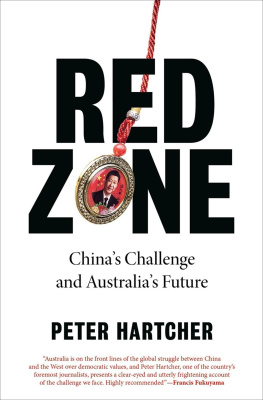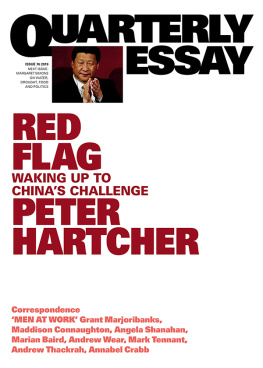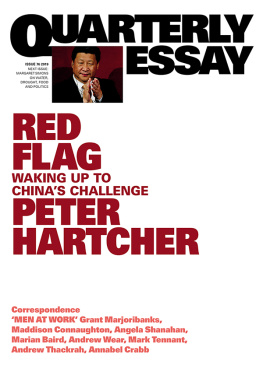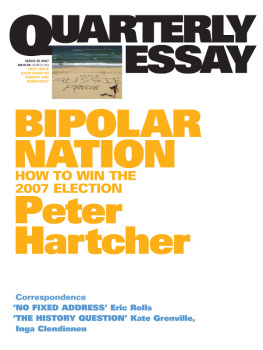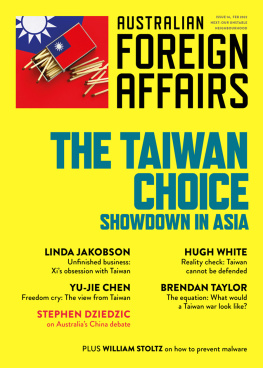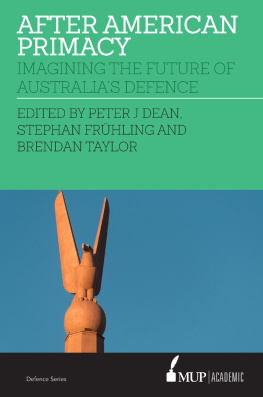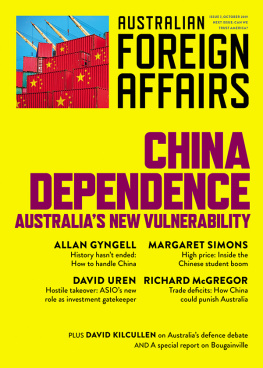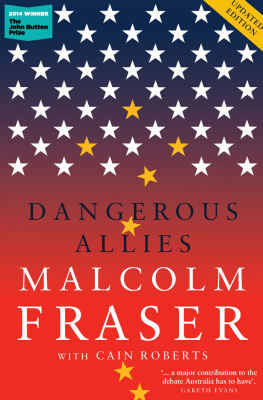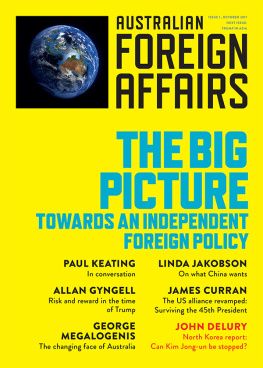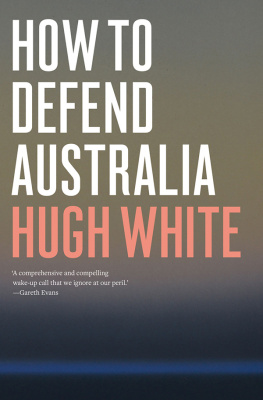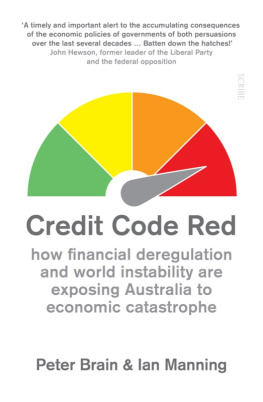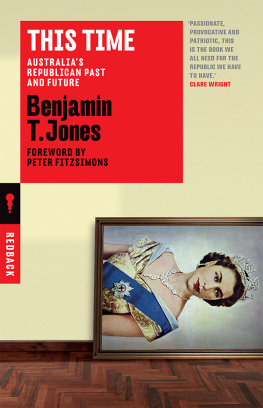| Red Zone : China's Challenge and Australia's Future (2021) |
| Hartcher, Peter |
|
What does China want from Australia?
In this incisive and original book, Peter Hartcher reveals how decades of economic dependence left Australia open to the strategic ambitions of the most successful authoritarian regime in modern history.
He shows how ideology, paranoia and Xi Jinpings personal story have reshaped China, and shines new light on Beijings overt and covert campaign for influence over trade and defence, media and politics.
Australia has now woken up to Chinas challenge, from passing foreign interference laws to banning Huawei from our 5G network.
But at what cost?
Will we see a further slump in relations?
How best to protect our security, economy and identity?
Drawing on interviews with Scott Morrison, Malcolm Turnbull and other key policymakers, as well as a rare interview with Australias spy chief, Red Zone is a gripping look at Chinas power and Australias future.
'Australia is on the front lines of the global struggle between China and the West over democratic values, and Peter Hartcher, one of the countrys foremost journalists, presents a clear-eyed and utterly frightening account of the challenge we face'.


Published by Black Inc.,
an imprint of Schwartz Books Pty Ltd
Level 1, 221 Drummond Street
Carlton VIC 3053, Australia
www.blackincbooks.com
Copyright Peter Hartcher 2021
First published as Quarterly Essay 76. This revised edition published 2021.
Peter Hartcher asserts his right to be known as the author of this work.
ALL RIGHTS RESERVED.
No part of this publication may be reproduced, stored in a retrieval system, or transmitted in any form by any means electronic, mechanical, photocopying, recording or otherwise without the prior consent of the publishers.
9781760642167 (paperback)
9781743821794 (ebook)

Cover design by Akiko Chan
Text design and typesetting by Typography Studio
Cover image: Bloomberg / Contributor / Getty
To Australia,
a life raft of liberty in a rising tide of tyranny
CONTENTS
INTRODUCTION
In one of the most enduring tales of humanitys long story, the Greek hero Odysseus is sailing home from victory in the Trojan War when his storm-tossed ship, thrown off course, finds itself upon a strange land. Hungry and thirsty after nine days in savage storms, Odysseus and his crew go ashore and soon find water and game. The captain then sends three of the crew ahead to scout out who might live there men like us perhaps, who live on bread. But the crew fail to return. Odysseus himself eventually goes in search and finds them mingled among the natives, Lotus-eaters, Lotus-eaters who had no notion of killing my companions, not at all, they simply gave them the lotus to taste instead. Scholars today suggest that the lotus of Homers Odyssey was actually the Egyptian blue lotus, the sacred narcotic water lily of the Nile. As Homer described, its effects were remarkable: Any crewmen who ate the lotus, the honey-sweet fruit, lost all desire to send a message back, much less return. They forgot themselves their mission, their homes, their families their only wish to linger there with the Lotus-eaters, as Homer tells the tale. Sensing danger, Odysseus drags them, in tears, back to the ship by force. He lashes them under the rowing benches and orders the rest of the crew to row hard for home.
Australia has spent years feasting on a metaphorical lotus. History and geography delivered the storm-tossed Australian economy onto the shore of a strange land, the once-mighty Middle Kingdom. Australias political and business elites scouted ahead and discovered the sweet, opiatic seduction of effortless growth and easy profit. The elements came together with great serendipity: Canberra recognised the Peoples Republic of China in 1972; a year later, Australia was shocked to lose its privileged access to the British market when the UK joined the European Economic Community; five years after that, China made its epochal decision to enter the global market economy. Chinas economic rise was about to occur, and it would carry Australia with it.
The first Australian scouts were followed by more of their kind, who tasted the lotus and soon thought of little else. Just as Ancient Egyptian priests took the blue lotus to enter a euphoric trance that allowed them to commune with the gods, Australias elites considered themselves a special priesthood with insight into the godlike beings who controlled the supply of the lotus: the chieftains of the Chinese Communist Party (CCP). Swooning in their enchanted haze, the scouts didnt stop to ask why they were chosen. They only called for the rest of the crew to follow. They didnt speak the local tongue, knew little of the land. They knew only one thing: the craving. The national dependency deepened.
Australian business and political leaders were the subjects of Chinas foreign elite capture policy. The New Zealand Sinologist Anne-Marie Brady, a leader in the scrutiny of Chinese global power and influence, describes this as a comprehensive strategy to target foreign economic and political elites, in order to get them to promote Chinas foreign policy agenda within their own political system. The founder of modern China, Mao Zedong, described this as a policy to make the foreign serve China. A great complacency took hold, not only in Australia but around the world. China grew to become the biggest trading partner of more than 120 nations. It has promised to invest in more than sixty countries under its Belt and Road initiative, the largest global infrastructure program since the Roman Empire.
Why was Odysseus so alarmed at the euphoric forgetfulness of his crew as they abandoned themselves to the lotus?
In 1990, then paramount leader Deng Xiaoping urged restraint on a China that was beginning to pulse with the possibilities of its own rising power. Deng urged his compatriots to hide your brightness, bide your time. Xi Jinping has overturned this strategic maxim, which guided Chinese policy for almost a quarter-century under three presidents. He has declared that China is now striving to achieve. This is a crystallising statement of Chinas transformation. It was a status quo power. It is now an ambitious one.
On taking power in 2012, Xi said that he was laying the foundation for a future where we will win the initiative and have the dominant position. Xi and Chinas rulers had decided that the preparatory phase was over. Theyd subdued the commercial and political classes in Australia and many other nations. China had built strength while the world was entranced by the lotus. And now it was time for China to exert its power.
Under Xi, China has seized maritime territories claimed by its neighbours, ignored an international court ruling that found this to be illegal, and fortified the territories with advanced weapons systems. Under Xi, China has imprisoned at least one million of its ethnic Uighur citizens in Xinjiang Province on the basis of their Muslim religion, denied that it had done so, but then conceded that it was a program of mass re-education, a policy likened to apartheid and cultural genocide. Xi personally issued an internal instruction to show no mercy.

